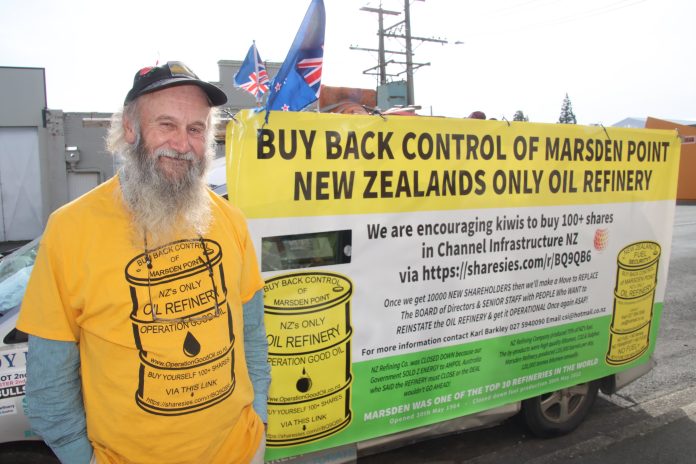
A growing grassroots movement is campaigning to have the Marsden Point oil refinery operating again.
In 2022 Channel Infrastructure, formerly known as New Zealand Refining, shut the refinery.
Operation Good Oil spokesman Karl Barkley is travelling throughout the country promoting the project, which aims to get shareholder control of Channel Infrastructure and reinstate the refinery.
If 100,000 people bought a hundred shares each in the company, shareholders would be able to vote out the existing board, Mr Barkley said.
‘‘It’s a publicly listed company on the New Zealand sharemarket.’’
It would not matter how many shares people bought as long as they were ‘‘engaging in the process’’, he said.
So far there had been a positive response from those he had talked to and about 50 people had bought shares, which would give them voting rights at a general meeting, Mr Barkley said.
The refinery was built in 1962 and began operating in 1964 to give the country ‘‘fuel security’’, he said.
‘‘We are at the most critical time in our history as far as being at risk of running out of fuel because we no longer have an oil refinery.’’
It made sense to keep the refinery open as it provided a guaranteed supply of product, he said.
‘‘Now we’re reliant on a ship coming in.’’
If tankers did not turn up or the product did not meet the standard required, the country would run out of fuel very quickly, he said.
He had heard there was only eight days supply of fuel nation-wide and if that was used up the country would ‘‘come to a grinding and disastrous halt’’, which would affect everyone.
‘‘No fuel means no food production, no transport to travel and no economy.’’
The refinery had provided 70% of the nation’s fuel, 89% of jet fuel and 120,000 tonnes of bitumen and carbon dioxide at about $2 a kg, he said.
The sulphur which was taken out of the crude oil was used as fertiliser.
Thirty-five tankers brought the crude oil to the refinery but now 175 were bringing in the refined product as well as ships bringing in bitumen and carbon dioxide.
‘‘The carbon footprint for what they are doing now is far [bigger] than what it was when we were operating our own refinery.’’
The refinery had been one of the top 10 refineries in the world, he said.
He believed the fuel being imported was of inferior quality to what the refinery had produced.
He had been told by oil industry workers the imported fuel contained sulphur and was causing corrosion in the fuel pipeline.
It was his understanding filters in the pipeline needed to be changed twice a week because of sulphur.
Mr Barkley has previously stood as an independent candidate in the former Clutha-Southland electorate.




